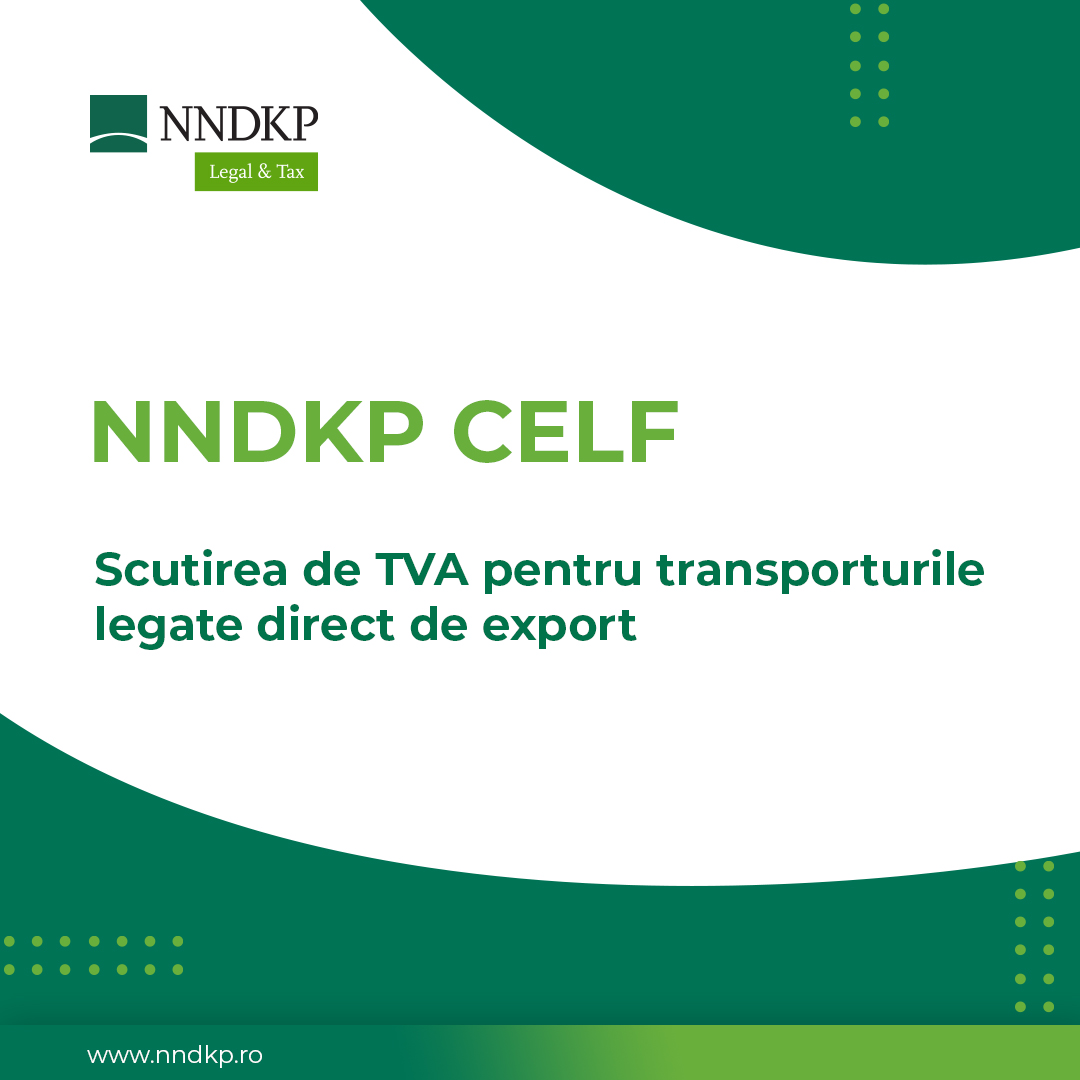
NNDKP CELF Alert No. 1/2023 – VAT exemption for transport directly connected with exportation
11.04.2023 – VAT exemption for transport directly connected with exportation
The Romanian version of this newsletter is available here.
Recently, the Romanian tax authority challenged the VAT exemption for transport directly connected with export applied by several players in the field whereby such services are not invoiced directly to the exporters/recipients of the goods, in particular for the transport organized by freight forwarders.
We recommend businesses that do not invoice transport services directly to the exporter/recipient of the goods to review the VAT treatment applied.
Please find below the details
Supplies of services, including transport and ancillary services, directly connected with the export of goods, are VAT exempt.
As per the implementing regulations, based on the Court of Justice of the European Union’s (CJEU) decision in case C-288/16 ‘L.Č.’ IK, the services directly connected with the export of goods must contribute to the effective performance of the export and be supplied directly to the exporter or the recipient of the goods exported.
o Consequently, the tax authority has taken the view that, as long as the transport is subcontracted (and thus not invoiced directly to the exporter/recipient of the goods), the subcontractors cannot apply the VAT exemption.
We believe that this position is debatable in the case of transport organized by freight forwarders because:
o The activity of freight forwarders is different from the mere subcontracting of a transport service.
o In case C-288/16 ‘L.Č.’ IK, CJEU invoked its previous case-law on the application of the VAT exemption on the economic chains of supplies to vessels (e.g., C‑185/ 89 Velker or C‑181/04 to C‑183/04 Elmeka) because these two exemptions work similarly, pursuing the same objectives.
o However, the CJEU fine-tuned this position in case C-33/16 A Oy when it decided to apply the VAT exemption both to services provided to the ship owner/operator, as well as to services provided at a previous stage, such as the service provided by a subcontractor to an economic operator who subsequently invoices it to a freight forwarder or a transporter, as well as to the services of this nature provided to the owner of the cargo, who may be the exporter or the importer. This conclusion was also adopted by Order 103/2016.
The VAT exemption for transport directly connected with export was discussed in the European Parliament at the request of Danish Shipping. Specifically, the Danish Shipping asked the European Commission and all EU Member States not to levy VAT along any part of trade chain on the transport of goods exported out of EU territory, together with the obsolete practice of accepting only a customs declaration, and not any evidence from which the competent authorities can infer with a sufficiently high degree of probability that the transported goods left the EU.
o The petition was formulated in the context of case C-288/16 ‘L.Č.’ IK, arguing that, based on the more recent case C-495/17 Cartrans, the VAT exemption for the transport of exported goods should apply along the entire supply chain, taking into account the ‘objective nature’ of the exemption.
o The European Commission replied that the decision reached by the CJEU in case C-495/17 Cartrans does not contradict C-288/16 ‘L.Č.’ IK. The judgment in case C-495/17 Cartrans does not focus on whether a sub-contractor can apply the exemption but rather on the rules on proof that the goods were exported.
o In this context, the European Commission supported the guidelines of the VAT Committee resulting from the meeting no. 112 of 12 April 2019: the VAT exemption will apply only to the services provided directly to the exporter or the recipient of the exported goods.
Based on the above, interested businesses (e.g., transporters, forwarding agents etc.) should review the VAT exemption applied to transport services that have not been invoiced to the exporters/consignees and determine if corrections are needed or not.
o The correction by applying VAT would be justified by the fact that the additional VAT amount would in principle be recoverable from and by their customers (so it would not become a cost) and the penalties are significantly lower in case of voluntary compliance (0.01% v. 0.08% per day). Late payment interest of 0.02% per day is due in both cases. Both the additional VAT and the ancillary liabilities can be – under certain conditions – be rescheduled, obtaining also additional benefits (total or partial reduction of interest and penalties).
o If maintaining the VAT exemption, it should be supported with both arguments and supporting documents.

